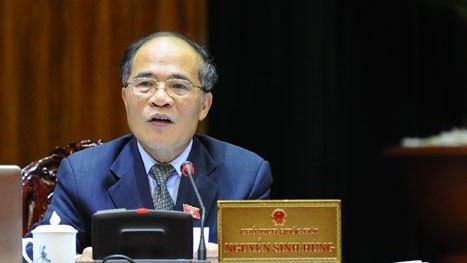(VOVworld)- National Assembly Chairman Nguyen Sinh Hung, in an article on newspapers on Monday, highlighted the special significance of the revised Constitution. The Chairman said that the revised Constitution champions the people’s sovereignty, human rights and the mechanism to control state power.

National Assembly Chairman Nguyen Sinh Hung |
National Assembly Chairman Hung said the revised Constitution is the outcome of a hard, serious, scientific and democratic working process. In the Vietnamese constitutional history, this was the rare political-legal campaign to be widely and actively responded to by people inside and outside the country. The Party’s guidelines and people’s wishes are harmoniously integrated in the Constitution.
The people’s sovereignty is the fundamental point
The revised Constitution institutionalizes more comprehensively the Party and State viewpoints on promoting the people’s sovereignty and socialist democracy and ensuring that all State power belongs to the people. This is the fundamental viewpoint that is consistently presented in the revised Constitution indicating that the origin, nature, purpose and strength of the state are from the people and of the people, and that people is the supreme subject of state power. The revised Constitution strongly affirms that “The Socialist Republic of Vietnam is mastered by the people and all state power belongs to the people”. The preface of the revised Constitution affirms that Vietnamese people are the subject in building, implementing and defending the Constitution. Vietnamese people exercise state power through their representatives in the National Assembly and People’s Council, and voting at people’s referendums organized by the state including the referendum on Constitutional revisions. The revised Constitution continues to highlight the Communist Party of Vietnam’s leadership role over the State and society. This role is assigned by history, admitted by the people and confirmed by the Constitution. The revised Constitution further clarifies and deepens the vanguard nature and people nature of the Party stipulating that the Party is closely associated with the people, serves the people, is supervised by the people, and is responsible to the people for its decisions”.
Promoting human rights
Human rights and citizens’ rights and fundamental obligations are highlighted in the first lines of Chapter II of the Constitution. National Assembly Chairman Nguyen Sinh Hung says this stipulation is the continuation of the 1946 Constitution reflecting a more comprehensive and deeper way to institutionalize the Party and State’s viewpoints on promoting humans considering humans the subject, key resource and goal of development. The Constitution affirms the principle that “the State recognizes, respects, protects and ensures human rights and citizens’ rights in terms of politics, economics, culture and society”; and that “Human rights and citizens’ rights will only be limited according to the law in necessary cases for the purposes of national defense, national security, social order and safety, social ethics, and community health”. These are the fundamental principles to promote the State responsibility in the relation with human rights and citizens’ rights. This is also the supreme legal foundation for the people and community to protect and exercise their human rights and citizens’ rights.
Building a mechanism to control state power
To continue to build and fine-tune the law-governed socialist state of Vietnam, the revised Constitution stresses the Vietnamese State is a socialist state governed by law, of the people, by the people and for the people and adds a principle for organizing state power. The revised Constitution affirms that state power is unified, assigned, coordinated and controlled in implementing legislative, executive and judiciary rights. This is a new principle that was added to the Party Platform and institutionalized in the revised Constitution.
The first time ever institutionalization of the National Electoral Council and the State Audit in the Constitution as Constitutional Institutions in a separate chapter reflects the modern constitutional and judicial trend. Chairman Hung said that the formulation of these two institutions in the Constitution is the continuation of promoting democracy, implementing the principle that all state power belongs to the people and helping people exercise their right to mastery in elections and their right to control state power.
Hung also touched upon the task of national safeguarding, Vietnam’s consistent foreign policy and the reform of local administrations to meet the demands of national development in the new period.
At the end of his article, Chairman Hung expressed his belief that the revised Constitution ensures a firm political and legal foundation for the Party, people and army to move forward into the new era of national renovation.